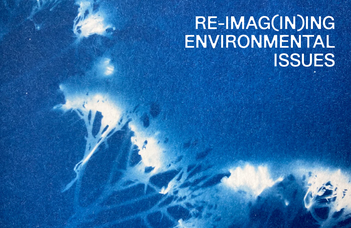Re-imagin(in)g environmental issues
An interdisciplinary course on visual environmental communication


The course fee for 1-week on-site courses - that includes tuition fee, meals (coffee break and lunch), local transport and the cost of the leisure time programs - is 490 EUR. All applicants are required to pay 90 EUR (out of this 490) as registration fee at registration. The registration fee is non-refundable.
Credits: 4 EC
Our course offers ECTS points, which may be accepted for credit transfer by the participants' home universities. Those who wish to obtain these credits should inquire about the possible transfer at their home institution prior to their enrolment. The International Strategy Office will send a transcript to those who have fulfilled all the necessary course requirements and request one.
Venue: ELTE Faculty of Humanities, Building R5, Room 137
APPLICATION:
Please pay the registration fee and fill out this form: https://www.elte.hu/en/environmental-issues-bsu2024
COURSE DESCRIPTION
In line with the fundamentals of design-based research this collaborative course consists of two complementary modules. On the one hand it gives a theoretical introduction into the field of environmental communication, focusing on its visual aspects. We will analyse different forms, actors and platforms of visual environmental communication (i.e. news media, political communication, pop cultural artefacts, art) and features of their iconography and visual narratives. On the other hand, students will work on their own research-based design project. Identifying the local level form of a global environmental problem they will find ways to address and reformulate these visually in a creative form. Throughout this process students will be introduced to analogue image-making techniques by an experienced artist teacher. The course aims to critically examine environmental communication, identifying the actors and underlying power structures that determine it, and develop effective and creative visual communication strategies around the topic.
Course Schedule
1. 15th July, Monday 11:00-12:30 Introduction
2. 15th July, Monday 13:30-15:00 What is nature?
A historical overview of cultural changes regarding the concept of nature and the environment. What economic, social or environmental processes have shaped the relationship between human and nature? Why is the idea of exploitation and domination of nature (i.e.the capitalist economic system ) rooted in Europe? When and why did the idea of protecting the environment arise? A short introduction into the history of environmental movements.
3. 16th July, Tuesday 9:00-10:30 An introduction to the field of environmental communication
In contrast to critical categories of social oppression and inequality such as race, gender or class, has the issue of nature belatedly become a focus of cultural studies. What is the reason for this? What is environmental communication concerned with, what is ecocriticism and green cultural studies? The pragmatic and constitutive functions of environmental communication. Environmental communication as a crisis and care discipline. Is or should science be value neutral?
4. 16th July, Tuesday 11:00-12:30, Visual environmental communication
Beyond stock iconography of environmental themes.Examining semiotics of pictorial representations, while defining the three defining contexts of visual communication. Cultural resonances in condensed visual symbols i.e., polar bear, globe, leaf.
5. 16th July, Tuesday 13:30-15:00 -A visual walk back to biodiversity- introduction to the first design project
6. -7. 17th July, Wednesday 9:00-10:30, 11:00-12:30
On the margins of garden and forest. Students will work in groups of two to design a poster with an experienced artist teacher.
Students will design their own posters and print in a local riso-shop, using the environmentally friendly technique of risograph.
8. 17th July, Wednesday 13:30-15:00 Environmental movements
From the wilderness movement to Greenpeace. A historical overview of environmental movements such as conservation, deep ecology, social ecology. Key ideas and their heritage for the 21st century environmental thought.
9. 18th July, Thursday 9:00-10:30 Ecology and art
Why manual artistic practices and stylistic choices matter when creating environmentally themed visual art. Examples from the contemporary art world from land art to ecological art.
10. 18th July, Thursday 11:00-12:30 Animated environments
Throughout the class we explore how nature is being symbolically constructed culturally through various pop cultural artefacts. This class focuses on how animated blockbusters speak about environmental problems, natural phenomena and humans’ relation to nature. How Disney's Hollywood mammoth changed frames of nature from Bambi to Zootopia.
11. 18th July, Thursday 13:30-15:00 In the name of plants-cyanotype project set up
Introduction and set up of the second design project. Students will work individually on their second design project, following the ideas of deep-ecology.
12-13. 19th July, Friday 9:00-10:30, 11:00-12:30 In the name of plants-cyanotype project
Creative process using plants and organic materials outdoors.
14. 19th July, Friday 13:30-15:00 Summary and reflections
Please note that there might be slight changes in the schedule.
